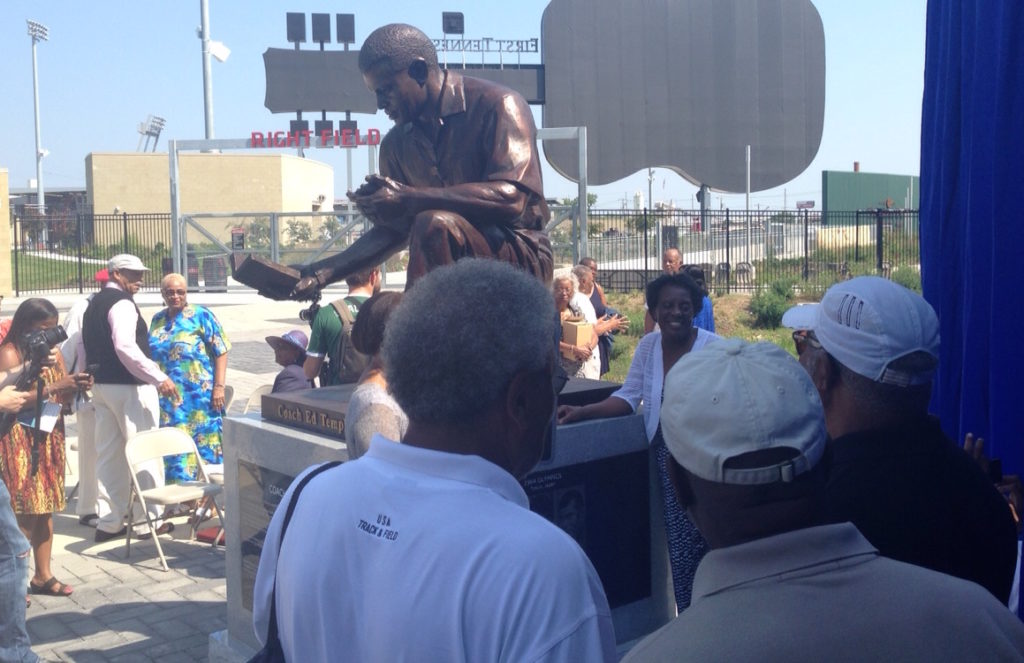
This story has been updated following the unveiling of the statue Friday morning.
A bronze statue was unveiled Friday near the Nashville Sounds’ new ballpark.
It depicts longtime Tennessee State track coach Ed Temple on one knee with an open book in one hand and a stopwatch in the other.
It’s a pose he likely struck countless times during his 44-year career as he imparted advice to his legendary Tigerbelle teams — who he says are the ones who deserve to be honored.
”They’re the ones that made the statue. I didn’t run those races. They’re the ones that won the races,” he said.
Temple was a 23-year-old grad student in 1950 when he was hired as the women’s track coach at TSU. The job didn’t pay much so he kept his part-time job at the post office. Together he was making $150 a month and still living in a university dorm.
“I only had three athletes, and we only had one track meet a year, but we went to the Tuskegee relays and we trained all year for that one meet.”
But the program quickly grew, as did Temple’s reputation for recruiting budding talent — like Mae Faggs from Bayside High School in Queens, New York.
“I call her, more or less, the mother of the team because she brought us that fire and zip and everything,” said Temple. “She was only 5-foot-1 but she was tremendous.”
Wilma and Wyomia
Just five years after Temple took over, the team won a national championship. The following year the school placed six athletes, including Mae Faggs, on the Olympic squad in Melbourne, Australia. The bronze-medal relay team that year also featured a 16-year-old from Clarksville who’d spent summers training with coach Temple. It wasn’t until four years later however, that Wilma Rudolph sprinted into history.
“You know the ’60 Olympics in Rome where Wilma won her three gold medals. That opened up the door, I think, for women’s sports, period,” Temple said. “Regardless of which sport — basketball or softball or whatever.”
Temple was the coach of that wildly successful 1960 Olympic team. Four years later, they asked him to lead the squad again, but he hesitated.
“I went home and told my wife and she told me ‘I don’t see why you won’t go back’ and I said ‘my goodness’, I said ‘we had the ’60 Olympic team and what we accomplished and everything. I mean we can’t do no better. The only thing we can do is go down, we can’t go up.'”
Prodded by his wife, he
did end up coaching in ’64 and his protégé, Wyomia Tyus won the 100-meter race. Four years later she ran even faster — set a world record — and became the first ever to win back-to-back gold medals in that marquee race.
‘A Right Way and A Wrong Way and His Way’
Tyus was a Georgia native whose dad died when she was 15. She too caught the attention of Temple at one of his summer camps and after enrolling at TSU began to see her coach as a father figure…a very strict father figure.
“His rules always. There’s a right way, a wrong way and his way. So you always had to do it his way.”
She says Temple had an exacting set of rules: keep up your grades, don’t ride in cars other than the team’s nine-passenger Desoto station wagon and they could never be late for practice.
“I mean you could be,” Tyus
remembered. “But you didn’t want the afterwards of that.”
From her home in Los Angeles, Tyus, who turns 70 on Saturday, says the Tigerbelles team was like family. But no matter how well you did on the international stage, back on the TSU campus, gold medals didn’t earn you any special privileges.

“I think that was the best thing. Coach Temple never treated his Olympians any different than the girls that did not make the Olympic team,” she said.
Tyus’
Olympic triumph in 1968 came at a time of racial unrest in the country. She says, as a result, her homecoming could be described as muted at best.
“I went to the Olympics and won back-to-back 100 meters,” she said. “And it was like nothing happened. And then people started saying ‘that’s never been done, that’s never been done’, well, I knew that, but there was no publicity about all that. And it was because of the times, I think.”
It wasn’t until nearly three decades later, shortly before the 1996 Atlanta Olympic games, Tyus’ hometown named a park after her.
‘Do The Best With What You
Could’
At
87 years old, Ed Temple still marvels at his athletes’ resilience.
There was the tension of the time and a lack of full scholarships. It was before Title IX gave female sports equal funding, leaving that brown two-toned station wagon to double as the team bus.
“I don’t know how they overcome it,” he said. “Sitting here now looking back, I don’t know how we done it. Well, we didn’t have nothing else. You had to take what you had and do the best with what you could.”
And quite often the Tigerbelles were best in the world. Under Temple’s leadership 40 members of the TSU women’s track team competed in the Olympics winning 23 medals, more than half of them gold.
He’s one of only four coaches who’ve been inducted to the U.S. Olympic Hall of Fame
The statue sits on a granite base in a part of town sandwiched between downtown and North Nashville. The location was chosen so that Temple’s presence, just like his legacy, can be seen beyond the TSU campus.


